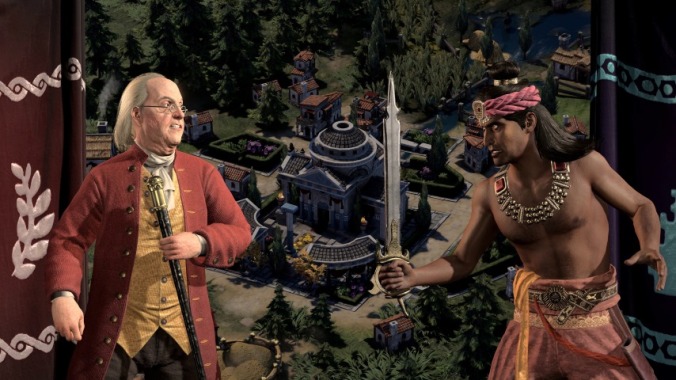Civilization VII: The Beginning of a New Age

When Civilization VII arrives on February 11, players will be introduced to perhaps the biggest change the series has seen in its 34-year history. The new Ages system revamps how civilizations move from one historical era into the next. In the past periods like the Classical Era and Industrial Era were little more than on-screen flavor text that roughly corresponded to the approximate timeline of the real world. Civilization VII treats them as definitive breaks within a civilization’s history, with three distinct ages serving as three chapters of a playthrough. You’ll even get one of those report card-style rankings you’d see at the end of a game of Civ at the end of each age. You’ll know when you’re moving from the Antiquity Age into the Exploration Age into the Modern Age, as a precipitating in-game crisis triggers each transition. And although it’s not exactly like starting over, it does serve as a kind of mid-game inflection point that hasn’t traditionally existed in Civ games. The goal is to make Civ feel dynamic and fluid throughout a whole game, and lessen that typical Civ situation where bad decisions early on can hamper your civilization thousands of years later.
The Ages system might be Civ VII’s most dramatic new addition, but it’s only one of many tweaks and updates the developers at Firaxis Games are making to the venerable series. Paste recently talked to Ed Beach, Civ VII’s Creative Director, and Dennis Shirk, Executive Producer, about the Ages system, the expanded role historians played in developing Civ VII, and more. Here’s what you can expect from Civ VII.
The following conversation has been edited for clarity and concision.
Paste: In the past you’ve talked about the rule of thirds when it comes to sequels—how ideally they’d be one third new features, one third improved, and one third staying the same. How do you know when something should be improved or replaced with a new feature?
Ed Beach, Creative Director: This time we struggled with this a little bit, even though we’re supposedly masters at using this principle. We had done a really in-depth look at Civilization VI, and what was working and what wasn’t working. And I had asked the designers of each of the systems within Civ VI what they wanted to change and what they felt like was still working. And they came back with a very aggressive list of things to change. We had to tell them, no, we can’t change all those things. That’s changing way more than a third of the game in a drastic new direction, and we have to kind of let our players still feel grounded. Let this still feel like this is a Civilization experience for them. So we did a lot of prioritization. I think we took some systems like our combat system that was working pretty darn well in V and VI in terms of how two units engaged in combat. And even though we had ideas on how we might want to change those, I said, hey, if that’s really not something that needs to change, that’s not a top priority to change, because it’s working pretty well. Let’s not mess with it. So we absolutely did apply those principles. We talked about it and it led to some scaling back in some areas. But I do think overall, we’re probably breaking that one third, one third, one third principle. I think we got a little bit aggressive in terms of how much we want to change. But you know, it’s been nine years since the last version. So it was time for some new ideas.
Dennis Shirk, Executive Producer: When we talk about Civ IV, Civ V, Civ VI, and all the other studios that are making Civ-like games right now, it was just time to take it a little bit further, and allow our fans to have to approach something with like new eyes to be able to figure it out and unpack it. New strategies. We thought it was a good moment for that.
Paste: So about the number of Civ influenced 4X games that have been coming out the last couple decades: Do you find yourselves influenced by those games? Do you look to them to see what Civ could become, or do you try to avoid looking at the competition like that?
EB: I think it’s mostly avoiding it. You can’t totally avoid it. Obviously, you know, they’ve had some bold ideas, and we’re all sort of… I feel like Civ VI put a big stake in the ground, and then everyone was poking at it and trying to figure out where its weak spots were, and trying to come up with new ways to improve it, including ourselves. And you’re gonna come to some of the same conclusions. You’re gonna see some things in some of those competing products that are the same ideas that we have in terms of what we want to try. So there’s definitely some overlap in thinking, and there were cases where competitors tried things, and we could see how well they resonated with a 4X strategy fan base or not. But by the time we actually realized there was going to be three or four competing products coming out over the time period between Civ VI and Civ VII, there was no way we could try to cover what other ones are doing, or try to respond directly. We had to chart our own course.
Paste: The biggest new feature in Civ VII is the new ages system. Is that something you wanted to work towards for a while now?
 Keep scrolling for more great stories.
Keep scrolling for more great stories.
